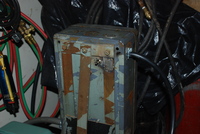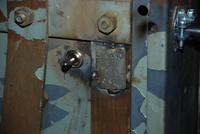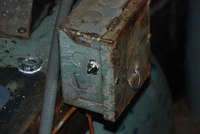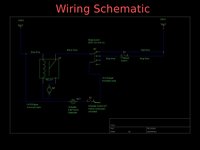 Up
Up
I have added two switches to my compressor so that it can work in several modes. I will describe what one switch does, and then will mention another. With the continuous/on demand switch, compressor can do the following: 1) Be OFF and UNLOADED 2) Pump on demand. This is the simplest mode of operation that any Sears electric compressor would do. When the pressure is below a certain limit, it would RUN, and when it rises above another limit, it UNLOADS and STOPS. 3) Continuous run. This is what engine driven compressors do, as well as what is recommended at heavy air use. According to Quincy, this is the recommended mode when it needs more than six restarts within one hour. The way it works is that the compressor starts unloaded, then it is LOADED if the pressure is below a certain limit, and UNLOADED but RUNNING is the pressure rises above a certain limit. This way, the compressor pumps as necessary, but never stops running. I implemented this with a DPDT On-Off-On switch. I have tested the operation to see that the compressor unloads when turned OFF, and turns on and off as prescribed in the two modes. The second switch has a much simpler meaning. If it is in the ON position, the unloader functions and loads the compressor according to the signal. If it is in the OFF position, the unloader NEVER loads (compressor stays unloaded), and therefore the compressor would spin, or not, but would never pump any air. Why this strange mode, you may ask. And the answer is that in this mode, the 10 HP motor of the compressor is acting as an idler motor, running with an inertial load, but not really doing mechanical work (besides 2 HP or whatever it takes to spin the pump that is idle). So effectively it can make my 17.5 HP phase converter into a 25 HP or so phase converter, allowing for power dissipation needed to run the pump.



